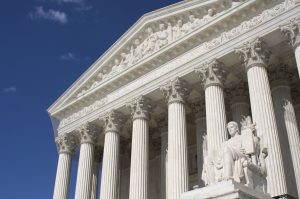WHAT WE'RE READING
The morning read for Friday, May 24
Each weekday, we select a short list of news articles, commentary, and other noteworthy links related to the Supreme Court. Here’s the Friday morning read:
- Supreme Court rules in South Carolina gerrymandering case (Nina Totenberg, NPR)
- Supreme Court throws out race claim in South Carolina redistricting case in win for GOP (Lawrence Hurley, NBC News)
- Supreme Court Conservatives Add New Minority Voter Roadblocks (Kimberly Strawbridge Robinson, Bloomberg Law)
- Tired, testy and fractured: The Supreme Court prepares for more drama (Joan Biskupic, CNN)
- Supreme Court’s thin veil of “good faith” in racial gerrymandering case (Bill Britt, Alabama Political Reporter)
Coming up: On Thursday, May 30, the court expects to issue one or more opinions from the current term. We’ll be live at 9:45 a.m. EDT.





